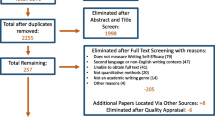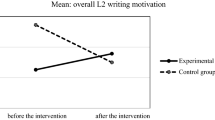Abstract
This explanatory sequential mixed methods study investigated the writing feedback perceptions of middle and high school students (N = 598). The predictive and mediational roles of writing self-efficacy and perceptions of writing feedback on student writing self-regulation aptitude were examined using mediation regression analysis. To augment the quantitative findings, the explanations students provided for either liking or disliking writing feedback were explored using open-ended questions. Quantitative findings revealed that students’ perceptions of the feedback they receive about their writing partially mediated the relationship between writing self-efficacy and writing self-regulation aptitude. Qualitative data suggested ways in which students perceive writing feedback—both positive and negative. Collectively, the quantitative and qualitative data illustrate the influential role writing feedback perceptions plays in middle and high school student writing motivation and self-regulation beliefs.

Similar content being viewed by others
References
Bandura, A. (2001). Social cognitive theory: An agentic perspective. Annual Review of Psychology, 52(1), 1–26.
Bandura, A. (2006). Guide to constructing self-efficacy scales. In F. Pajares & T. Urdan (Eds.), Self-efficacy beliefs of adolescents (pp. 307–337). Greenwich, CT: Information Age.
Bandura, A., & Cervone, D. (1983). Self-evaluative and self-efficacy mechanisms governing the motivational effects of goal systems. Journal of Personality and Social Psychology, 45, 1017–1028.
Bangert-Drowns, R. L., Hurley, M. M., & Wilkinson, B. (2004). The effects of school-based writing-to-learn interventions on academic achievement: A meta-analysis. Review of Educational Research, 74(1), 29–58.
Bruning, R., Dempsey, M., Kauffman, D., McKim, C., & Zumbrunn, S. (2013). Examining dimensions of self-efficacy for writing. Journal of Educational Psychology, 105(1), 25–38.
Burke, D. (2009). Strategies for using feedback students bring to higher education. Assessment & Evaluation in Higher Education, 34(1), 41–50.
Caffarella, R. S., & Barnett, B. G. (2000). Teaching doctoral students to become scholarly writers: The importance of giving and receiving critiques. Studies in Higher Education, 25(1), 39–52.
Calfee, R., & Sperling, M. (2010). On mixed methods: Approaches to language and literacy research. New York: Teachers College Press.
Carless, D. (2006). Differing perceptions in the feedback process. Studies in Higher Education, 31(2), 219–233.
Cleary, T. J., & Zimmerman, B. J. (2004). Self-regulated empowerment program: A school-based program to enhance self-regulated and self-motivated cycles of student learning. Psychology in the Schools, 41(5), 537–550.
Corbin, J., & Strauss, A. (2008). Basics of qualitative research. Thousand Oaks, CA: SAGE Publications Inc.
Creswell, J. W., & Plano Clark, V. L. (2011). Designing and conducting mixed methods research. Thousand Oaks, CA: SAGE Publications Inc.
De Vaus, D. (2002). Surveys in social research. Abingdon, Oxforshire: Routledge.
Ekholm, E., Zumbrunn, S., & Conklin, S. (2015). The relation of college student self-efficacy toward writing and writing self-regulation: Writing feedback perceptions as a mediating variable. Teaching in Higher Education, 20(2), 197–297.
Ferris, D. R. (1997). The influence of teacher commentary on student revision. TESOL Quarterly, 31(2), 315–339.
Garcia, J. N., & de Caso, A. M. (2006). Changes in writing self-efficacy and writing products and processes through specific training in the self-efficacy beliefs of students with learning disabilities. Learning Disabilities: A Contemporary Journal, 4(2), 1–27.
Garcia-Sanchez, J. N., & Fidalgo-Redondo, R. (2006). Effects of two types of self-regulatory instruction programs on students with learning disabilities in writing products, processes, and self-efficacy. Learning Disability Quarterly, 29(3), 181–211.
Graham, S. (2006). Writing. In P. Alexander & P. Winne (Eds.), Handbook of educational psychology (pp. 457–478). Mahwah, NJ: Erlbaum.
Graham, S., Berninger, V., & Fan, W. (2007). The structural relationship between writing attitude and writing achievement in first and third grade students. Contemporary Educational Psychology, 32(3), 516–536.
Graham, S., & Harris, K. R. (2000). The role of self-regulation and transcription skills in writing and writing development. Educational Psychologist, 35(1), 3–12.
Graham, S., & Herbert, M. (2011). Writing to read: A meta-analysis of the impact of writing and writing instruction on reading. Harvard Educational Review, 81(4), 710–744.
Hebert, M., Gillespie, A., & Graham, S. (2013). Comparing effects of different writing activities on reading comprehension: A meta-analysis. Reading and Writing, 26(1), 111–138.
Higgins, R., Hartley, P., & Skelton, A. (2001). Getting the message across: The problem of communicating assessment feedback. Teaching in Higher Education, 6(2), 269–274.
Hsieh, H. F., & Shannon, S. E. (2005). Three approaches to qualitative content analysis. Qualitative Health Research, 15(9), 1277–1288.
Huizinga, M., Dolan, C. V., & van der Molen, M. W. (2006). Age-related change in executive function: Developmental trends and a latent variable analysis. Neuropsychologia, 44, 2017–2036.
Lee, W., Lee, M. J., & Bong, M. (2014). Testing interest and self-efficacy as predictors of academic self-regulation and achievement. Contemporary Educational Psychology, 39(2), 86–99.
Lizzio, A., & Wilson, K. (2008). Feedback on assessment: Students’ perceptions of quality and effectiveness. Assessment & Evaluation in Higher Education, 33(3), 263–275.
Magno, C., & Amarles, A. (2011). Teachers’ feedback practices in second language academic writing classrooms. The International Journal of Education and Psychological Assessment, 6(2), 21–30.
Marrs, S., Zumbrunn, S., Mewborn, C., & Stringer, J. K. (2015). Exploring elementary student perceptions of writing feedback. Manuscript submitted for publication.
Meece, J. L., Anderman, E. M., & Anderman, L. H. (2006). Classroom goal structure, student motivation, and academic achievement. Annual Review of Psychology, 57, 487–503.
Nicol, D. J., & Macfarlane-Dick, D. (2006). Formative assessment and self-regulated learning: A model and seven principles of good feedback practice. Studies in Higher Education, 31(2), 199–218.
Pajares, F. (2003). Self-efficacy beliefs, motivation, and achievement in writing: A review of the literature. Reading & Writing Quarterly, 19(2), 139–158.
Pajares, F., & Miller, M. D. (1995). Mathematics self-efficacy and mathematics performances: The need for specificity of assessment. Journal of Counseling Psychology, 42(2), 190.
Patton, M. Q. (2002). Qualitative research and evaluation methods. Thousand Oaks, CA: Sage.
Poulos, A., & Mahony, M. J. (2008). Effectiveness of feedback: The students’ perspective. Assessment & Evaluation in Higher Education, 33(2), 143–154.
Price, M., Handley, K., Millar, J., & O’Donovan, B. (2010). Feedback: All that effort, but what is the effect? Assessment & Evaluation in Higher Education, 35(3), 277–289.
Rowe, A. (2011). The personal dimension in teaching: Why students value feedback. International Journal of Educational Management, 25(4), 343–360.
Rowe, A. D., Fitness, J., & Wood, L. N. (2014). The role and functionality of emotions in feedback at university: A qualitative study. The Australian Educational Researcher, 41(3), 283–309.
Rust, C. (2002). The impact of assessment on student learning how can the research literature practically help to inform the development of departmental assessment strategies and learner-centred assessment practices? Active Learning in Higher Education, 3(2), 145–158.
Sandelowski, M. (2000). Whatever happened to qualitative description? Research in Nursing & Health, 23, 334–340.
Santangelo, T., Harris, K. R., & Graham, S. (2007). Self-regulated strategy development: A validated model to support students who struggle with writing. Learning Disabilities: A Contemporary Journal, 5(1), 1–20.
Schunk, D., & Swartz, C. (1992). Goals and feedback during writing strategy instruction with gifted students. Paper presented at the annual meeting of the American Educational Research Association, San Francisco.
Schunk, D. H., & Zimmerman, B. J. (2007). Influencing children’s self-efficacy and self-regulation of reading and writing through modeling. Reading & Writing Quarterly, 23, 7–25.
Teddlie, C., & Tashakkori, A. (Eds.). (2009). Foundations of mixed methods research: Integrating quantitative and qualitative approaches in the social and behavioral sciences. Thousand Oaks, CA: SAGE Publications Inc.
Themanson, J. R., Pontifex, M. B., Hillman, C. H., & McAuley, E. (2011). The relation of self-efficacy and error-related self-regulation. International Journal of Psychophysiology, 80(1), 1–10.
U.S. Department of Education. (2011). Writing 2011: National Assessment of Educational Progress at grades 8 and 12. Washington, D.C.: Institute of Education Science.
Usher, E. L., & Pajares, F. (2008). Sources of self-efficacy in school: Critical review of the literature and future directions. Review of Educational Research, 78(4), 751–796.
Värlander, S. (2008). The role of students’ emotions in formal feedback situations. Teaching in Higher Education, 13(2), 145–156.
Wellington, J. (2010). More than a matter of cognition: An exploration of affective writing problems of post-graduate students and their possible solutions. Teaching In Higher Education, 15(2), 135–150.
Zimmerman, B. J. (2002). Becoming a self-regulated learner: An overview. Theory into Practice, 41(2), 64–70.
Zimmerman, B. J., & Bandura, A. (1994). Impact of self-regulatory influences on writing course achievement. American Educational Research Journal, 31, 845–862.
Zimmerman, B. J., & Risemberg, R. (1997). Becoming a self-regulated writer: A social cognitive perspective. Contemporary Educational Psychology, 22(1), 73–101.
Zimmerman, B. J., & Schunk, D. H. (Eds.). (2007). Motivation and self-regulated learning: Theory, research, and applications. New York: Routledge.
Zumbrunn, S. (2015). The most difficult parts of writing. Unpublished raw data.
Zumbrunn, S., & Bruning, R. (2011, December). Do conversations about writing matter? The relationship between elementary students’ writing conversations and writing beliefs, perceptions, and success. Paper presented at the Literacy Research Association Annual Meeting, Jacksonville.
Zumbrunn, S., Conklin, S., Varier, D., Turner, A., & Dumke, E. (2013, April). Self-efficacy is only part of the story: The role of feedback perceptions on student writing self-regulation. Poster presented at the American Educational Research Association Annual Meeting, San Francisco.
Zumbrunn, S. K., Bruning, R. H. Kauffman, D. F., & Hayes, M. (2010, April). Explaining determinants of confidence and success in the elementary writing classroom. Poster presented at the American Educational Research Association Annual Meeting, Denver.
Acknowledgments
This work was supported by the Virginia Commonwealth University Presidential Research Incentive Program and the Virginia Commonwealth University Foundation Langshultz Fund. The authors would like to thank Chesterfield County Public school district, the teachers, and the students who participated in this research.
Author information
Authors and Affiliations
Corresponding author
Ethics declarations
All procedures performed in studies involving human participants were in accordance with the ethical standards of the institutional and/or national research committee and with the 1964 Helsinki declaration and its later amendments or comparable ethical standards. Informed consent was obtained from all individual participants included in the study.
Conflict of interest
The authors declare that they have no conflict of interest.
Appendix: Scale items
Appendix: Scale items
Student Writing Feedback Perceptions Scale
-
I like talking with my teachers about my writing.
-
I like it when my classmates comment on my writing.
-
I like it when teachers comment on my writing.
-
I feel good about teachers’ comments about my writing.
-
I feel good about my classmates’ comments about my writing.
-
I feel good about my family members’ comments about my writing.
Self-Efficacy for Writing Scale
-
I can spell my words correctly.
-
I can write complete sentences.
-
I can punctuate my sentences correctly.
-
I can think of many ideas for my writing.
-
I can put my ideas into writing.
-
I can think of many words to describe my ideas.
-
I can concentrate on my writing for a long time.
-
I can avoid distractions when I write.
-
I can keep writing even when it is difficult.
Writing Self-Regulation Aptitude Scale
-
Before I start writing, I plan what I want to write.
-
Before I write, I set goals for my writing.
-
I think about who will read my writing.
-
I think about how much time I have to write.
-
I ask for help if I have trouble writing.
-
While I write, I think about my writing goals.
-
I keep writing even when it’s difficult.
-
While I write, I avoid distractions.
-
When I get frustrated with my writing, I make myself relax.
-
While I write, I talk myself through what I need to do.
-
I make my writing better by changing parts of it.
-
I tell myself I did a good job when I write my best.
Rights and permissions
About this article
Cite this article
Zumbrunn, S., Marrs, S. & Mewborn, C. Toward a better understanding of student perceptions of writing feedback: a mixed methods study. Read Writ 29, 349–370 (2016). https://doi.org/10.1007/s11145-015-9599-3
Published:
Issue Date:
DOI: https://doi.org/10.1007/s11145-015-9599-3




